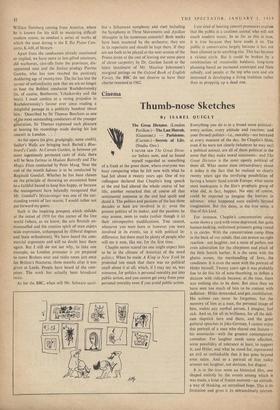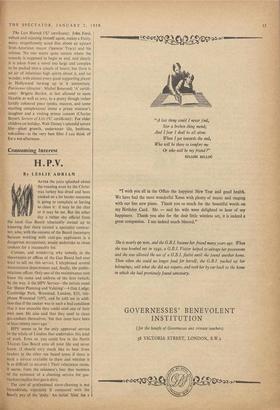Cinema
Thumb-nose Sketches
By ISABEL QUIGLY The Great Dictator. (London Pavilion.)—The Last Hurrah.
(Gaumont.) Parisienne. (Curzon.)—Secrets of Life. (Studio One.) I NEVER saw The Great Dicta- tor before now, and so found myself regarded as something of a freak at the press show, where everyone was busy comparing what he felt now with what he had felt about it twenty years ago. One of my colleagues declared that Chaplin's long speech at the end had altered the whole course of her life; another remarked that of course all that sentimental nonsense at the end had spoilt and dated it. The politics and passions of the last three decades at least are involved in it : even the present politics of its maker, and the passions he may arouse, seem to make (unfair though it is) their retrospective modifications. You cannot, whenever you were born or however you were involved in its events, see it with political in- difference; but there must be plenty of people who will see it now, like me, for the first time. - Chaplin seems scared (as one might expect him to be in the climate of America) of the word politics. When he made A King in New York he protested too much that there was no political smell about it at all; which, if I may say so, was nonsense, for politics is personal morality put into public action, and you cannot get away from your personal morality even if you avoid public action. Everything you do is in a broad sense political : every action, every attitude and reaction; and your (broad) politics—i.e., morality—are betrayed at every moment of the day. So Chaplin's films, even if he were not clearly (whatever he may say) a political animal, are all of them political in the sense that they make moral statements: and The Great Dictator is the most openly political of them all. What seems most extraordinary about it today is the fact that he realised so clearly twenty years ago the terrifying possibilities of having a lunatic fiend astride Europe; what seems most inadequate is the film's prophetic grasp of what did, in fact, happen. No one, of course, could be expected to imagine the horrors in advance: what happened went entirely beyond imagination. But this dates, in the true sense, a film of this kind. • For instance, Chaplin's concentration camp scene shows a yard with some depressed, but quite human-looking, uniformed prisoners going round it in circles. With the concentration camp films in the back of our minds, that can arouse no right reaction : not laughter, not a sense of pathos, not even admiration for the chirpiness and pluck of the little Jewish barber. It is the same with the ghetto scenes, the manhandling of Jews, the rowdiness. It is even the same with the portrait of Hitler himself. Twenty years ago it was probably fine to do this bit of nose-thumbing, to deflate a dictator with ridicule because, at the time, there was nothing else to be done. But since then we have seen too much of him to be content with deflation : Hitler demanded, and got, annihilation. His actions can never be forgotten; but the memory of him as a man, the personal image of him, makes any norfnal person, I imagine, feel sick. And so, for all its brilliance, for all the deli- cate slapstick here and there, and the great guttural speeches in joke-German, I cannot enjoy this portrait of a man who shared one feature— his moustache—with the greatest contemporary comedian. For laughter needs some affection, some possibility of tolerance at least, to support it; and Hitler, and what he stood for, represented an evil so unthinkable that it has gone beyond even satire. And so a portrait of him today arouses not laughter, not derision, but disgust.
It is in the true sense an historical film, one shaped entirely by the events among which it was made, a kind of frozen moment—an attitude, a way of thinking, an unrealised hope. This is its limitation and gives it its extraordinary interest. The Last Hurrah ('U' certificate): John Ford, robust and enjoying himself again, makes a fruity, noisy, magnificently acted film about an upstart Irish-American mayor (Spencer Tracy) and his retinue. No one seems quite certain where the comedy is supposed to begin or end, and clearly it is taken from a novel too large and complex to be packed into a couple of hours; but there is an air of infectious high spirits about it, and no wonder, with almost every good supporting player in Hollywood turning up in it somewhere. Parisienne (director : Michel Boisrond; 'A' certifi- cate): Brigitte Bardot, at last allowed to seem likeable as well as sexy, in a pretty though rather luridly coloured piece (pinks, mauves, and some startling complexions) about a prime minister's daughter and a visiting prince consort (Charles Boyer). Secrets of Life (`U' certificate): Por older children on holiday, Walt Disney's splendid nature film—plant growth, underwater life, beehives, volcanoes—is the very best filler I can think of for a wet afternoon.











































 Previous page
Previous page